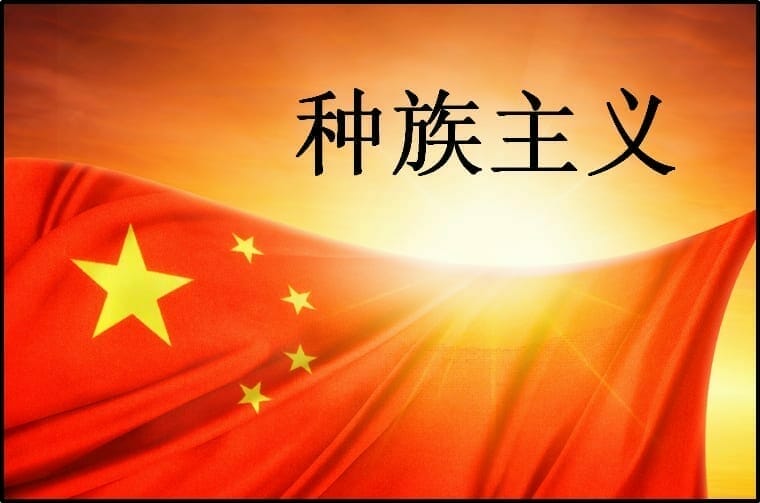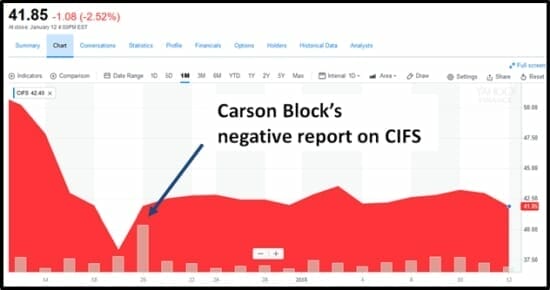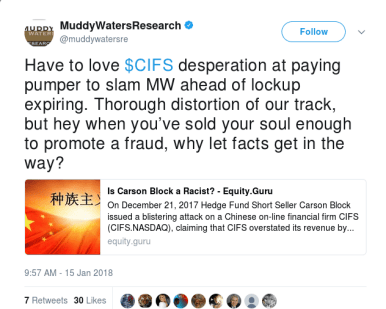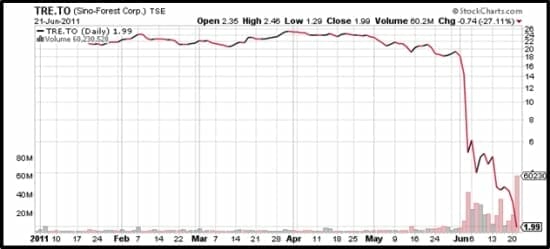On December 21, 2017 Hedge Fund Short Seller Carson Block issued a blistering attack on a Chinese on-line financial firm CIFS (CIFS.NASDAQ), claiming that CIFS overstated its revenue by 500%.
According the company profile on Yahoo Finance, CIFS “provides financial advisory services to meet the financial and capital needs of small-to-medium sized enterprises in the People’s Republic of China. It also provides value-added Internet information services.”
Mr. Block – a feisty 41-year-old lawyer – is the CEO of Muddy Waters – a $100 million hedge fund that makes money placing negative bets (put options or short-selling) on Chinese companies – and then trying to drive the stock price lower by issuing free critical research reports.
According to CIFS’s 2017, Q3 earnings report, the company saw revenue up 26.2% to $5.1 million, while net profit increased by 31.9% to $5 million.
A couple of weeks later Mr. Block concluded that CIFS is “just another worthless China fraud”.
- We believe zero to almost none of CIFS’s purported business is real.
- Every one of the purported borrowers to which CIFS disclosed having made appears to be a sham counterparty.
- CIFS’s recently announced “big data” company purchase also appears to be a lie. It is from sham counterparties, and therefore a fraudulent purchase of an empty box, rather than of a real or even promising company.
- 47.3% of CIFS’s reported 2016 net income purportedly was generated by its Kashgar subsidiary; however, that subsidiary existed for only two days in 2016.
- Chairman Lin seems to be an obscure and fairly unsuccessful businessman.
- This structure is the coup de grace of the numerous middle fingers he’s extending at U.S. investors.
Despite Mr. Block’s legendary status in the industry, the stock price of CIFS has been flat since the negative report was published. CIFS currently has a market cap of $921 million.
We don’t want to get into a head-butting contest with a team of Mandarin-speaking forensic accountants.
But we are going to review the track record of Mr. Block and examine whether he – and by extension Muddy Waters – has an unfounded anti-China bias.
[Editor’s Note: Shortly after the publication of this article, Mr. Block tweeted that the content is a “thorough distortion of Muddy Water’s track record”, and that we have “sold our souls”.]
The first thing to note is that 10 years ago, Mr. Block launched a self-storage business in Shanghai called Love Box Storage, which tanked. He failed to hire competent management, secure property leases – or sign joint ventures with Chinese companies.
“I lost a lot of money in China through hard lessons,” stated Block in a Globe & Mail interview, “as did most entrepreneurs I know there, before I really understood where the pitfalls are.
I’ve lost the kind of money in China that might make some of these guys throw themselves off a building. That’s how I understand what is going on.”
I learned how easily perceptions can be manipulated in China.”
Sino-Forest Corp delivers a Blockbuster return
Block got famous in 2011 when he accused $6 billion Sino-Forest Corp of being a Ponzi scheme. (They said they owned a lot of trees). Block was right. Sino-Forest was nothing but a filing cabinet full of forged documents. He made the institutional analysts look stupid. It was smart and ballsy. The stock price plummeted.
Sino-forest filed for bankruptcy.
Hedge fund legend John Paulson sold his Sino shares at a $720 million loss.
Block made an undisclosed profit on his short position.
Like many successful young people (Block was 35 at the time) he probably over-estimated the depth and breadth of his own skill set.
“Sino-Forest is saying ‘you don’t understand the tree business.’ The analysts say ‘oh, he doesn’t understand our industry,” recounted Block in 2011.
“You know what industry I do understand pretty well, it turns out? The fraud industry. So I don’t need to know trees to know fraud.”
I know a lot more about China than these analysts will ever know.”
Information Asymmetry is a powerful sales tactic. (I know something you don’t know). It’s why lawyers use big words. So you’ll pay them to guide you across the informational bridge.
It’s fair to ask: do the lessons learned from his China business failures – and a brilliant initial call on Sino-Forest – along with tourist-level Mandarin – make Block – in any meaningful sense – a “China Expert”?
Cue the misfires as short picks rally
Does Block know things that other alert market participants don’t know?
Muddy Waters track record over the last 7 years would suggest – “maybe not”.
American Tower – Up 28 per%
After dropping just 1.1 percent the day Block said the company was a “value-destroying investment binge,” the stock surged, adding US$11 billion to American Tower’s market value.
Olam International – up 22%
Shares of the Singapore-based commodity trader jumped after Muddy Waters said the company was likely to fail because of a high debt burden and poor investment decisions.
New Oriental Education & Technology Group – up 76%
Shares of the Chinese education company surged after Block claimed the firm misled investors. New Oriental has said that a probe by three independent company directors found no evidence to support fraud allegations.
Despite his inability to collect another scalp as big as Sino-Forest, Mr. Block continues to disparage China’s public markets.
“A lot of businesspeople in mainland China, to them, wealth transfer, from somebody else to them, is just as valid as wealth creation,” stated Block.
That’s a bit rich, isn’t it?
Bashing the Chinese for validating “wealth transfer”?
What is Muddy Waters, if not a pure mechanism for wealth transfer?
And it’s not entirely benign.
Carson Block can only make money while others are bleeding.
His victory requires victims.
He has every right run to his business in that way.
But there is no hard data to support the theory that the Chinese stock markets harbor more white-collar criminals than the NYSE or TSX.
On December 21, 2017, CIFS formed an independent special committee to conduct a review of the allegations raised in the Muddy Waters negative report.
The Special Committee is comprised of three independent directors, including Chairperson Hong Huang – a political science graduate from East China University. He also earned a masters degree in Law from the University of Trier, Germany.
“The Special Committee has decided to retain a top-tier international law firm to conduct an independent third-party investigation into these accusations. We look forward to providing investors and other interested parties with the results of the investigation shortly,” said Mr. Huang.
On December 26, 2017 CIFS entered into a “strategic cooperation agreement” with China Co-op Foreign Trade (CCFT) – a subsidiary of All China Federation of Supply and Marketing Cooperatives.
The two parties will be exploring “the joint development of a big data center for China’s Co-op and agricultural-related industries, a settlement center in support of the One Belt One Road Initiative.”
“We are impressed with the CIFS team and their achievement and capability in providing innovative financial advisory services to small-to-medium sized enterprises,” stated Guoping Yu, Chairman of CCFT, “We believe the Agreement provides a win-win situation for both parties and look forward to this strategic partnership to grow and bear fruit in years to come.”
CCFT is a subsidiary of All China Federation of Supply and Marketing Cooperatives – a producer and trader of agricultural products with an aggregate 2016 turnover of approximately USD $930 million.
According to GBTimes, “the All China Federation of Supply and Marketing Cooperatives saw a 14.4 percent year-on-year growth in revenue during the first half of 2017.”
Is Carson Block a racist?
Is CIFS a fraud?
In our opinion, the answer to both questions is “No”.
Block is an opportunist.
He has built his brand on being a “China Expert”.
If there was money to be made in trashing the Icelandic stock market – he’d do that.
CIFS is a legitimate Chinese financial company that needs to increase transparency so that North American investors, including Mr. Block, can better understand its business.
Full Disclosure: Equity.Guru was asked to take an in-depth look at this company from an outsider’s perspective. The author has been compensated for his work by the company on the condition that he be given full editorial control over the content.






Someone is about to get sued and it’s not Carson Block. Asking someone if they’re a racist is fighting words.
Thank you for reading “Short Seller Ideas”. “Fighting words” and “slanderous words” are two very different things. I have a lot of respect for Carson Block, which I hope is conveyed in the article. I am asking, and investigating, whether he has an anti-China bias. It’s a legitimate question.
I’ve been ‘about to get sued’ more times than I’ve been ‘about to eat broccoli.’ When folks realize what it means to actually do some suing, and what’s legal and what isn’t, the broccoli tends to win over.
Carson uses the terms “China Hustle”, “Chinese” management and “US investors” which are inflammatory and irresponsible. Chinese and non-US investors also got screwed. US citizens and “white” people were also part of those directed allegations. When people do bad things, race has nothing to do with it. He could have easily made those accusations without all the editorial non-sense, and adding country of origin to the equation. We get it. It catches more eyeballs, but it’s wrong. Carson Block uses the race card, and it’s bad karma.
Gary R, I agree with you. Although I know many Chinese nationals who have told me that Chinese people are more intrinsically crooked than Westerners. I don’t agree. National levels of crookedness are just a function of the localised opportunities, disincentives and rewards for breaking the rules. To be fair to Carson Block, he pulled off a couple of ballsy and brilliant take downs of fraudulent Chinese companies. Good detective work, good journalism. Much credit to him for that. Anti-China is a better brand than anti-corrupt. That’s what it boils down to. Thank you for your comments.